
Adjourned
Amy Pittenger
Associate professor and department head, Department of Pharmaceutical Care and Health Systems, College of Pharmacy
Chair, Faculty and Senate Consultative Committees
I recently looked back at the Adjourned article I wrote last April, and it was interesting to read my comments around the excitement on campus about the selection of our 17th president, and the difficult emotions regarding the building names and institutional history effort. Spring semester 2019 was both an exciting and challenging time, but, of course, we have all adjusted our concept of "challenging."
Despite the difficult semester we have all experienced this spring and the uncertainties we are facing for the summer and fall, we also have reasons to be thankful, including welcoming Executive Vice President and Provost Rachel Croson to the University of Minnesota, watching our University expertly address the many facets of the COVID‑19 challenge for Minnesota and the entire world, and the experience of coming together as a community to care for each other.
I'm so grateful to be at an institution with such a robust infrastructure and history around shared governance, and to President Joan Gabel for taking the time to consult with faculty, staff, and students, despite the urgency around the many decisions. In addition to our regularly scheduled meetings with President Gabel, Faculty Consultative Committee Vice Chair Professor Phil Buhlmann and I have been invited to serve on the President's Emergency Management team, along with President Gabel's senior leadership team. This group has met daily to address the constantly changing situation and to make the best decisions possible given the information available in the moment. Professor Buhlmann and I agree that it has been impressive and reassuring to watch our senior leadership team in action, and we very much appreciate being invited into the deliberations.
President Gabel has demonstrated through this crisis how much she values shared governance. Professor Buhlmann and I have been invited into the Academic & Student Affairs workgroup related to COVID‑19, and have each been asked to serve (in addition to other faculty representation) on other work groups—Academic & Research Planning and Finance & Operations Planning—which the president formed to advise her with planning strategies to advance the University in the midst of the challenges posed by the pandemic. We are lucky to have a president who relies on her deeply held values to guide her decision making. I also want to recognize all the students, staff, and faculty involved in governance whose time and efforts help make the University of Minnesota’s governance model a leader among peer institutions. We make better decisions because of all of your engagement.
On Friday, April 17, 2020, I called a special meeting of the Faculty Consultative Committee (FCC) to discuss the financial and budgetary challenges facing the University of Minnesota during the COVID‑19 crisis. The FCC believes it is imperative that the faculty respond proactively by considering ways we can contribute to the University’s response and recovery. Toward this effort, the FCC reached a consensus that the Faculty Senate should consider a temporary reduction of faculty compensation as one possible part of the response to financial stringency, as permitted under Board of Regents Policy: Faculty Tenure (this does not include faculty represented by a union) and released a statement to that effect. We are motivated in part by a shared desire to minimize layoffs and other alternatives that would disproportionately affect the University’s most vulnerable employees, and we want to make a clear statement of the faculty’s solidarity with the entire University community as we face these challenges together.
My role as FCC chair is ending soon. It has been a privilege to serve as both vice chair and chair of the Faculty and Senate Consultative Committees and to serve the University of Minnesota—an institution that has given me so much. I’m happy to report that Professor Buhlmann was elected FCC chair and Professor Ned Patterson FCC vice chair for the 2020-2021 academic year. I am truly excited for their leadership!
As we look forward to the next year, I am very optimistic about the University of Minnesota's future. The depth and breadth of excellence at our institution has been on display for the state and the world as we have helped to meet the challenges of the COVID‑19 situation. And, I'm optimistic because of all of you and the ways you contribute your time and talents to our missions and community.
Wishing you a safe and healthy summer.
Recognizing Outstanding Service to University Senate Governance
The Outstanding Service to University Senate Governance Recognition honors faculty, P&A, and civil service employees who have made a significant impact on University Senate governance. This year’s recipients are Jean Otto, Jennifer Goodnough, and Greta Friedemann-Sánchez.
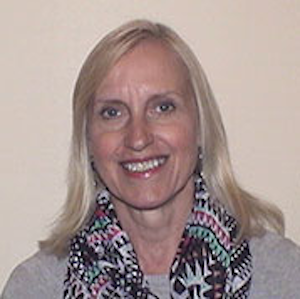
Jean Otto is a department administrator in the Department of Integrative Biology and Physiology in the Medical School at the University of Minnesota Twin Cities. Described as an energetic and tireless advocate for civil service staff, she has served on or as the chair of numerous committees for over the past six years. She has served on the Civil Service Consultative Committee and all three of its subcommittees, and currently serves as its chair, as well as chair of the Civil Service Senate. She was chair-elect of the Civil Service Consultative Committee, and has acted as the civil service hearing officer for the Office of Conflict Resolution. Otto is credited with working to change how the Civil Service Rules are viewed by the University. In 2017, as chair of the Employment Rules Subcommittee, she championed major editorial and administrative changes to the rules; she led the “unscheduled child care” leave rule change; and most recently, she led the effort on the new bereavement leave for civil service employees. She is a consummate University citizen.
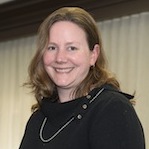
Jennifer Goodnough is an associate professor in the Division of Science and Math at the University of Minnesota Morris who has devoted conscientious effort and passion to governance service both on the Morris campus and in the University system. Goodnough has been involved for over 10 years as a member on several senate committees and as a senator representing the Morris campus. Currently, she serves as the chair of the Senate Committee on Educational Policy (SCEP) and as an ex officio member on the FCC, and previously chaired the Senate Committee on Academic Integrity. Those who are familiar with her service describe her as the expert on University policy on the Morris campus. Her work has been beneficial in representing the perspectives of the campuses in Greater Minnesota, while providing keen insight on systemwide concerns. Goodnough is described as the epitome of faculty leadership in University governance, and a prime example of how to do it well. Equally important, Goodnough communicates about the importance and the value of participatory governance and she encourages her 'younger' peers to be involved; she has a well-deserved reputation for being a governance guru. The University of Minnesota is grateful for her service.
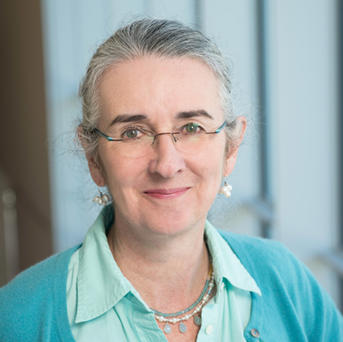
Greta Friedemann-Sánchez, associate professor, Humphrey School of Public Affairs, University of Minnesota Twin Cities, served on the FCC as a committee member and then as the vice chair. She currently serves as a senator representing the Humphrey School of Public Affairs. Friedemann-Sánchez is described as passionate and well-informed and as someone who “wasn’t afraid to speak up when controversial issues were discussed.” Friedemann-Sánchez is credited with successfully advocating for structural changes in the leadership and governance structure in the FCC. These changes advocated for a stronger role for the vice chair and proposed a model that codifies a path from vice chair to chair. In addition, she served as a member of a work group that conducted a review of stipends and the proposed changes of those stipends for chairs of various Faculty Senate committees. Called “a fearless leader” by her colleague, Friedemann-Sánchez resigned her vice chair role on the FCC to effect changes in FCC governance that strengthens the role of the vice chair position. She is a true inspiration and a valued member of the University community.
The Big Issues
The work of the University and Faculty Senates is accomplished primarily through their 22 standing committees, as well as numerous subcommittees and task forces. Faculty, academic professionals, civil service staff, students, alumni, and administrators have designated positions on most committees.
Systemwide Strategic Plan
During late fall and spring semester, President Gabel, her staff, and senior leadership consulted with numerous senate committees on the Systemwide Strategic Plan, including the Senate Committee on Educational Policy, the Senate Committee on Finance and Planning, the Senate Research Committee, the Faculty Consultative Committee, the Equity, Access, and Diversity Committee, and the Senate Committee on Student Affairs. The plan was also a major point of discussion at the University and Faculty Senate meeting on April 23, 2020. People expressed appreciation for the opportunity to provide input at every level of the plan before it was finalized, and various common themes emerged from these meetings. Many members underscored the importance of making sure graduate and professional students are included in student-related goals, and that staff are considered in goals related to wellbeing, equity and diversity, and financial decisions. Questions about how the commitments are related surfaced in several conversations; the administration emphasized that the commitments are not meant to be linear or siloed, but interconnected like cogs or a network. The Board of Regents will discuss the plan at its meeting in May, and it will be brought for a vote at the June meeting of the board.
Health Sciences Area Security
Several University Senate committees engaged with University Services leadership in the aftermath of changes to security procedures in the Health Sciences area. While students, faculty, and staff who work or learn regularly in the affected buildings generally expressed satisfaction in the results of the new procedures, a number of concerns were also raised. The P&A Consultative Committee discussed issues around implicit bias in checking identification, the disparate impact of more security personnel on campus on certain marginalized groups, and how to support the homeless community; these concerns were echoed by the Equity, Access, and Diversity Committee. The Disabilities Issues Committee emphasized the importance of continued efforts to improve accessibility around these new procedures. University Services acknowledged that broader consultation could have been beneficial, and is committed to ensuring equitable enforcement and accessibility of the new infrastructure. There are no current plans to replicate the security arrangements elsewhere across the campus, but University Services is consulting preemptively with interested parties, so that they can move quickly if a need arises.
Mental Health Environmental Scan
In fall 2019, President Gabel charged then Executive Vice President and Provost Karen Hanson and Chief Auditor Gail Klatt to conduct an environmental scan of student mental health services, programs, and resources across the system. To that end, the Mental Health Environmental Scan Team developed a survey, which was sent to each of the 51 Resource Responsibility Centers (RRC). The survey achieved a 100% response rate. The team analyzed the data and presented a report to the Board of Regents in February. Several University Senate committees are interested in further discussion of the scan, but such discussions were postponed in order to allow counseling staff to attend to student needs during the COVID‑19 pandemic.
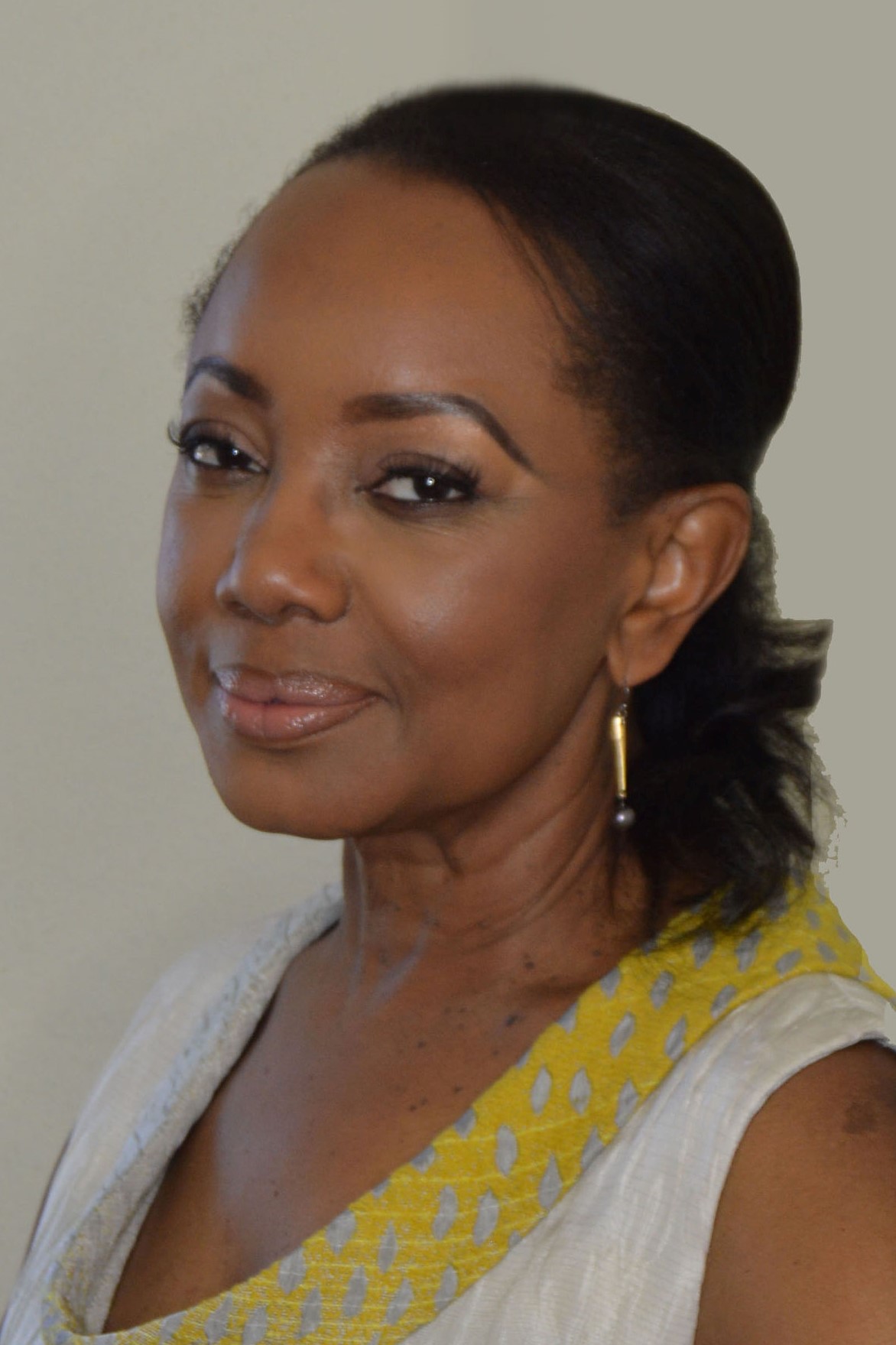
A View from the Inside
The Essential Diversity in Shared Governance
Etty DeVeaux
Chief of Staff, The Graduate School
Chair, Senate Committee on Committees
Today, we find ourselves in a moment of caution and uncertainty. The world today is a very different place than when I started at the University some 19 years ago. Indeed, it is a different world than when we started the term. And the University we return to will be forever changed. As an institution, we are conducting wholesale experiments on how to accomplish our mission in a virtual world. Inevitably, we will have discovered some great new things to do and new ways to do the things we've done for decades—and just as inevitably, there will be great enthusiasm for returning to our pre-pandemic ways. Governance, especially diverse governance, will play a critical role in helping us find the silver lining in this crisis.
As we reflect on this new reality and as I begin my second year as chair of the Senate Committee on Committees, the senate committee responsible to appoint members and chairs to many of our governance committees, I reflect on the University’s needs in this time of change, uncertainty, and transition. This pandemic has reminded us with urgency that we will need all of our diverse talents, views, perspectives, and experiences as we unite around the greater purpose, for the common good: ensuring the continued health and welfare of our University so that we may continue our service to society—the students we empower to be change agents, the service we provide to our communities, and the original research we conduct to solve society’s greatest challenges.
Intrinsic good; demonstrable advantages.
The concept of shared governance is central to the health of higher education institutions, now more than ever. The 1966 Statement on Government of Colleges and Universities recognizes the “joint effort,” that the variety and complexity of tasks performed by institutions of higher education produce an inescapable interdependence between the governing board, administration, faculty, students, and others. This relationship calls for meaningful collaboration and effective communication among those components—among all who learn and work here. The consequence of this work demands, necessarily, that we incorporate a diversity of perspectives, experiences, views, backgrounds, and beliefs in our governance structure. In order to inspire trust among the University community, our governing bodies must represent the diversity that exists within our classrooms, University, and communities.
The decisions we make and the changes they bring to our University are lasting. Decades of research has shown that socially diverse groups (that is, those with a diversity of race, ethnicity, gender, sexual orientation, nationality, or educational or socioeconomic background) are more innovative than homogeneous groups. In some situations, a diverse group of ordinary people can out-innovate a group of like-minded experts. This is true not only in boardrooms and classrooms, it is also true in governance. Diversity is a key factor in driving an organization’s success in the best of times—it is essential during these periods of change and disruption. This representation in governance from all University’s stakeholders in decision-making, from students to staff, faculty to alumni, administrators to community members—people who are different from ourselves, with viewpoints and experiences that contrast with our own—is the only thing that affords the necessary interrogation of the unknown unknowns—examination for possible blind spots and groupthink in our strategic planning and decision making.
Isomorphism, fatigue, and feelings of tokenism.
Diverse representation "is a social good for our institution. We believe our representation matters—a diverse committee composition provides viewpoints fair to all constituencies at the University1." Therefore, a primary focus for the Senate Committee on Committees has been, and continues to be, to recruit more diverse members of our University community. But University of Minnesota faculty are still predominantly white and male. Recruiting in majority networks comes with the challenges of implicit cognitive bias, and closed social networks2. Less than 31 percent of faculty are women and 16 percent are people of color1. "To achieve balance on any given committee means that women and people of color are over-represented vis-à-vis their actual numbers in the institution1." There is also the tricky reality that recruitment to governance committees often depends on tapping existing networks. Unfortunately, this means that the Senate Committee on Committee’s focus on increasing diversity can come with a serious unintended consequence—"considerable cost for those of us who serve1." Because our community is not yet as diverse as we wish it to be, the work continues to fall on the fatigued.
And, we know that diversifying governance means that institutions must move from safe basecamp levels of shared power to shared power at the highest levels of our University—“diverse boards and diverse senior leadership go hand-in-hand3."
Call to service.
In great part, we do this work not only because of the intrinsic good, but because it carries demonstrable advantages—we believe that diversity in governance can be one real and meaningful way to challenge systemic barriers on an ongoing basis, to critically reassess the status quo, and to counteract silo thinking. As our and other universities wrestle with how to build a campus that reflects the ideals and values we espouse, the challenging and difficult issues of bias, bigotry, racism, and intolerance; the challenges related to the COVID‑19 pandemic; and the challenges ahead that we cannot yet begin to imagine, we need everyone to commit anew to help our University think deliberately and proactively about the matters of substance that impact our ability to deliver our mission. In this time of uncertainty and transition, to achieve our maximum impact we need diverse voices at the governance tables to find sophisticated solutions to our most complex and obstinate problems and move our University forward.
In her February 14, 2020, message to the University community, President Gabel called on University leaders to grant faculty and staff flexibility to adjust their work schedules so that they may participate in University Senate governance meetings and activities. As chair of the Senate Committee on Committee, I ask you—we need you—to lend your voice and diverse perspectives to the best interest of our University.
University Senate Governance Working for U
Each senate has an executive—or "consultative"—committee. Members of the consultative committees are elected to represent the respective bodies.
Faculty Consultative Committee (FCC)
Spring semester 2020 started out much the same as in previous years—busy, but business as usual. In January, the FCC met with Liberal Education Redesign Committee (LERC) Chair Sally Kohlstedt and Vice Provost for Undergraduate Education Robert McMaster and debriefed on the liberal education discussion that took place at the Twin Cities Faculty Delegation meeting in December 2019. Additionally, members met with representatives from the Minnesota Student Association (MSA) who sought the committee’s feedback on how to move their proposed Safe Transfer Legislation through the state legislature. Then, in February, in addition to a brainstorming session to generate ideas for recruiting a contingency of faculty interested in supporting the University at the legislature, members met with Board of Regents Chair Kendall Powell and Brian Steeves, executive director and corporate secretary, Office of the Board of Regents. Regent Powell highlighted the Board of Regents’ priorities for the year, and engaged members in a candid conversation about a number of issues, including graduate/professional student tuition and student loan debt in general; the shortage of rural medicine (family practice) providers as well as the need for more Native American physicians; and faculty diversity.
Then came March 2020, and the world as we know it was turned upside down, given the COVID‑19 crisis and the governor’s stay-at-home order. In spite of this, the FCC persevered and continued meeting via Zoom—and actually added meetings to its schedule to ensure faculty members were being kept apprised of coronavirus related matters impacting the University system. In addition to electing its 2020-2021 FCC chair and vice chair, Professors Phil Buhlmann and Ned Patterson, respectively, the committee held its intellectual futures discussion with President Gabel and then Executive Vice President and Provost Hanson. The topic of this year’s discussion was 21st century challenges facing higher education and what can be done to maintain and forge a relevant, sustainable future.
Additionally this spring, the FCC was consulted on the revised spring semester 2020 Student Rating of Teaching (SRT) form, and the option for faculty to extend the tenure clock, the S/N grading option, as well as Administrative Policies: Traveling on University Business and Course Enrollment Limits and Cancellation. The FCC also drafted a financial stringency statement, due to the financial and budgetary challenges facing the University of Minnesota during the pandemic. This statement was brought to the April 23 University/Faculty Senate for information. The FCC also welcomed and met with Executive Vice President and Provost Rachel Croson.
Student Senate Consultative Committee (SSCC)
The Student Senate Consultative Committee (SSCC) and Student Senate addressed a variety of issues this semester and met with a number of individuals from across the University. Topics included an in depth discussion with Mike Berthelsen, vice president, University Services, regarding students’ perspectives on building and campus security, specifically within the Health Sciences area. The conversation centered around balancing safety and ensuring equitable access for all students, free from physical barriers and racial or stereotypical profiling. The SSCC also met with School of Public Health Dean John Finnegan, who serves as co-chair of the President’s Initiative to Prevent Sexual Misconduct (PIPSM). This initiative has been in place for nearly three years and has taken a public health-based approach to creating a long term culture change to prevent sexual misconduct on campus.
Additionally, at its February meeting, the Student Senate heard from Morris Campus Student Association President Sam Rosemark regarding a resolution on affordable and sustainable course materials. Rosemark pointed out that students spend about $1,200 on textbooks and materials each academic year; the resolution aims to encourage faculty to begin implementing electronic textbooks and open-source texts. In addition, the resolution asked that students be allowed to use electronic devices for academic purposes in the classroom. The Student Senate drafted a statement in support of the resolution and began having discussions with administrative leaders in the Office of Undergraduate Education to amend related language in Administrative Policy: Teaching and Learning: Student Responsibilities.
Civil Service Consultative Committee (CSCC)
The Civil Service Consultative Committee (CSCC) was busy continuing its work on updating the Civil Service Employment Rules to include bereavement leave for civil service employees. Public hearings for this new benefit were held in December 2019, and the final language was approved by the Board of Regents in February 2020. Bereavement leave for civil service employees took effect immediately after board approval.
The CSCC also consulted with senior administration on new building security measures implemented in the Health Sciences area on the Twin Cities campus, as well as on the Systemwide Strategic Plan. In March, members engaged in discussions with President Gabel on emergency COVID‑19 planning, merit pay, and the recent leadership change in the Office of Human Resources (OHR). The Joint Compensation Commission (JCC), which comprises civil service and P&A employees, prepared a survey to gather data from employees regarding compensation. Administration of the survey has been delayed due to the COVID‑19 situation.
The CSCC is monitoring issues at the University related to COVID‑19 to assess their impact on civil service employees. The CSCC continues to respond to questions and concerns from constituents during these turbulent times, and to advocate on their behalf.
P&A Consultative Committee (PACC)
Amid the uncertainty that enveloped the University community and the world during spring 2020, the P&A Senate and the P&A Senate Consultative Committee (PACC) continued their work of representing and advocating for the 7,000 P&A staff at the University of Minnesota. Chair Noelle Noonan invited PACC and senate members to consider new ways of being intentional, adaptable, decisive, and engaged, in spite of the unpredictability of the “new normal.”
PACC members advocated strongly for clarifying the use of parental leave and medical leave when requesting time off from work for a birth or an adoption event. As the committee fielded questions from constituents regarding the policies, it became apparent that explanations of how to use the two leaves differed widely among departments and units. Committee members worked with Ken Horstman, interim vice president, Office of Human Resources (OHR), to create a set of guidelines regarding use of the two leaves. Horstman also communicated his intention to have dedicated staff in central OHR to handle all leaves of this type, which would help create a more uniform application of the leaves.
The PACC heard from many P&A Senate members, students, and constituents that the new security measures implemented in the Health Science district were having a negative impact on some members of the University community. In a meeting with Mike Berthelsen, vice president, University Services, committee members relayed these concerns, which included discriminatory implementation of the new measures; the problematic tendency to conflate homelessness with crime; and a sense that the measures were implemented without adequate consultation with governance groups and populations adversely affected by the measures.
PACC members fielded numerous questions regarding the 27 pay periods for fiscal year 2021; so many in fact, that an informal subcommittee was established within the P&A Benefits and Compensation Subcommittee (B&C) to study the issue. Horstman and Amy Kucera, senior director of operations, OHR, attended the April 17, 2020, P&A Senate meeting to provide clarity. Senators intend to craft a resolution requesting clearer communication around this issue and how to prepare for the next eventuality of a year with 27 pay periods.
B&C was asked to review and give recommendations to OHR documents titled “Flexible Work Schedules: Introduction Playbook” and “Employee Guide for Requesting Flexible Work Schedules.” B&C leadership and the Flexible Work Arrangements working group provided feedback and requested edits to these documents to be more representative of P&A work.
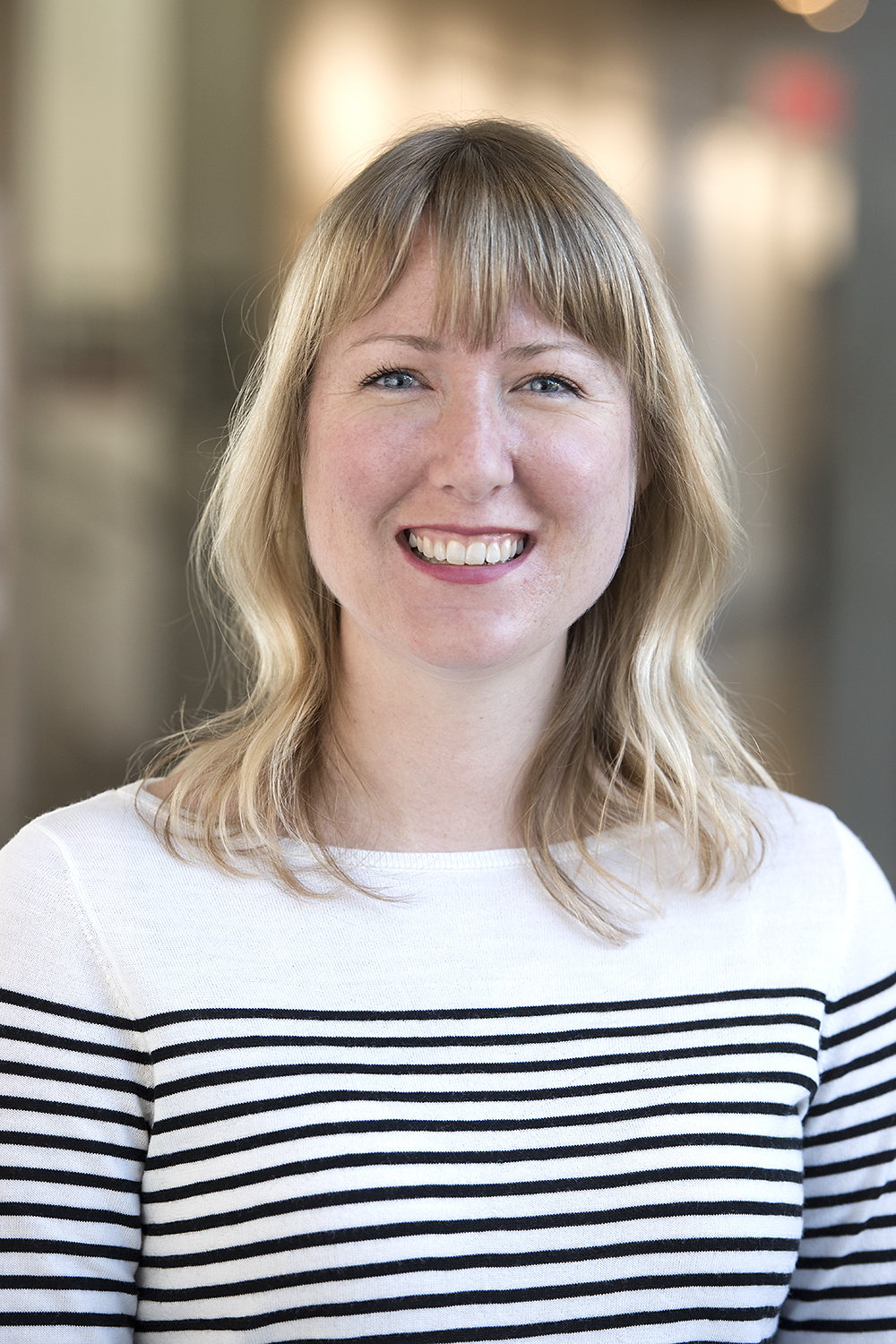
Demystifying
The Student Sexual Misconduct Hearing Process on the Twin Cities Campus
Bobbie Erichsen
Hearing officer, Student Sexual Misconduct Subcommittee
Senate associate, University Senate Office
When a student is accused of sexually assaulting another student, how does the University respond? How does the institution protect a student who reports being stalked by another student, while also investigating and adjudicating the accused student fairly and impartially? If a student confides in a professor that they are experiencing sexual violence in their romantic relationship, what is that professor’s responsibility, and how does the University determine whether there has been a violation of the Student Conduct Code?
The University has a responsibility to provide a safe and anonymous way to report sexual misconduct; to conduct a fair and impartial investigation of the report; to determine whether a violation has occurred based on the facts; and to adjudicate proportionality to protect the students involved and the campus community. These elements make up the student conduct process.
When I joined the University Senate Office in 2017, the responsibilities assigned to me included facilitating the Twin Cities campus student conduct process through supporting the Student Sexual Misconduct Subcommittee (SSMS), a subcommittee of the Campus Committee on Student Behavior. The SSMS is responsible for holding formal hearings to determine whether a student has engaged in sexual misconduct. Unlike many other college campuses, the University of Minnesota integrates shared governance into the process, which allows for student cases to be evaluated by trained students, faculty, and staff, in addition to University administrators.
Over the course of these past three years, I have come to realize that the University of Minnesota’s processes and procedures related to student sexual misconduct are not widely understood across the campus community. It is my hope that this quick overview sheds light on how student sexual misconduct is handled on the Twin Cities campus.
To start, it is important to understand what constitutes sexual misconduct. According to University policy, sexual misconduct involves one or more of these four elements:
- sexual harassment
- sexual assault
- stalking
- relationship violence
Each of these four types of conduct has its own definition, and there are two main policies at the University of Minnesota (Twin Cities Campus) that define these elements:
- Board of Regents Policy: Sexual Harassment, Sexual Assault, Stalking, and Relationship Violence; and,
- Administrative Policy: Sexual Harassment, Sexual Assault, Stalking, and Relationship Violence
This is the life cycle of a student sexual misconduct case:

Cases may—and often do— conclude at the end of any of the steps described below.
Report
There are many ways that an individual can report alleged misconduct against a student, including:
- online or via phone through UReport;
- online or via phone through Equal Opportunity and Affirmative Action (EOAA);
- filing with the University of Minnesota Police Department (UMPD).
As many of us learned during the required online training on sexual misconduct last year, University policy also requires employees to report allegations of prohibited conduct to the campus Title IX office, even if the police are involved. The Frequently Asked Questions (FAQs) can be instructive for those seeking to understand the reporting obligations.
Investigation
If an individual filing a complaint decides to move forward with a University investigation, an investigator from the EOAA office is assigned to the case. That investigator gathers an initial report; notifies the parties of the allegations; helps coordinate campus resources for support and accommodations; and gathers evidence, including documentation and witness interviews.
When an investigator has concluded an investigation (which generally includes multiple conversations with both parties), the investigator, in conjunction with the EOAA office, makes a preliminary findings based on the evidence they’ve gathered. The factual findings, analysis, and conclusion are drafted in a comprehensive investigative report, and then forwarded to the Office for Community Standards (OCS) for review and distribution to the parties.
Notification and Sanctions
If a student is found responsible for violating University policy, they are subject to consequences, which the Student Conduct Code refers to as “sanctions.” When OCS receives the EOAA investigative report, they review the findings and propose informal sanctions, if necessary.
For sexual misconduct violations (also known as Title IX violations), there is a range of sanctions that University administrators and SSMS panelists consider. OCS uses sanctioning guidelines to determine the informal sanctions. These guidelines are referenced during the hearing process as well.
Once sanctions have been determined, OCS notifies both parties of the EOAA investigator’s findings and any informal sanctions determined. Each party then has five days to accept the findings and the sanctions or request a hearing with the SSMS. A student may request that an SSMS panel reconsider the findings, the informal sanction(s), or both.
Formal Hearing
This is where shared governance steps into the process. There are three main responsibilities for the SSMS:
- Pre-hearing Conference: this is a preliminary meeting with the students to discuss how the hearing will be conducted, and to make sure all parties understand and have access to the SSMS Procedures.
- Hearing: The hearing is facilitated by a chair, and a panel of three SSMS members reviews evidence, listens to testimony, and makes a determination about whether there was a violation, and if so, what sanctions are appropriate. The panel must consist of one student, one faculty member, and one staff member.
- Decision Letter: After a hearing has concluded, the panel goes “off the record” to deliberate. Decisions made during deliberations about violations findings or sanctions are written into a report and distributed to the parties. The panel’s decision may mirror what has been decided by the EOAA investigator and OCS, or it may differ.
Now, just a quick side note to introduce the individuals involved in the hearing process. The student that is accused of sexual misconduct is referred to as the “respondent,” and the individual that has filed a report is referred to as the “complainant.” Both of these individuals, or “parties,” are allowed to bring two advisors to the hearing. An advisor may be an attorney, union representative, advocate, support person, or any other individual. During the hearing, each party may have one advisor in a “speaking role” and one advisor in a “support person” role.
During the hearing stage, the University becomes a party in the case, and generally the “complainant” becomes a witness for the University. For example, the case becomes the “University of Minnesota vs. the Respondent.” This means that the University presents the evidence that was gathered by the EOAA investigator; examines witnesses; and requests that the panel consider the sanctions offered by OCS.
Appeal
The respondent and the complainant both have an opportunity to appeal the findings or the sanctions imposed by the SSMS panel within five days of receiving the decision letter. The student requesting the appeal then has five additional days to file a letter outlining their grounds for appeal. If the appeal is granted by the appellate officer, then all evidence collected during the investigation and the hearing is reviewed, in addition to the pre-hearing and hearing recordings, and the appellate officer then makes a final decision based on this review.
I hope you have found this overview helpful and informative. To learn more about the work of the SSMS or other University Senate committees, or to get involved, please visit the University Senate website.
University/Faculty Senate Meeting Recap
April 23, 2020
The final University and Faculty Senate meeting of the academic year took place entirely online via Zoom. A livestream on YouTube was also offered and recorded. The meeting consisted of several items of routine business, followed by an extensive conversation with President Gabel on the Systemwide Strategic Plan and the University’s response to the challenges posed by COVID‑19. Of special interest was the FCC’s Statement Regarding Financial Stringency. Senators were generally supportive of the statement, with many offering suggestions to ground the decision-making process in the principles of equity, and to think creatively about strategies to address the financial situation. Senators also had the opportunity to comment on proposed changes to Board of Regents Policy: Namings. Throughout the meeting, members expressed appreciation for Gabel’s leadership, as well as that of Professor Amy Pittenger and the FCC.
With apologies...
It has come to our attention that, due to administrative error, a name was inadvertently omitted from the president’s list of recently deceased members of the community. Professor Donald Uden was a beloved colleague in the College of Pharmacy, who passed away suddenly. The University Senate Office offers our condolences to his family, friends, and colleagues, and apologizes for this oversight. His name will be read at the next meeting of the University Senate.
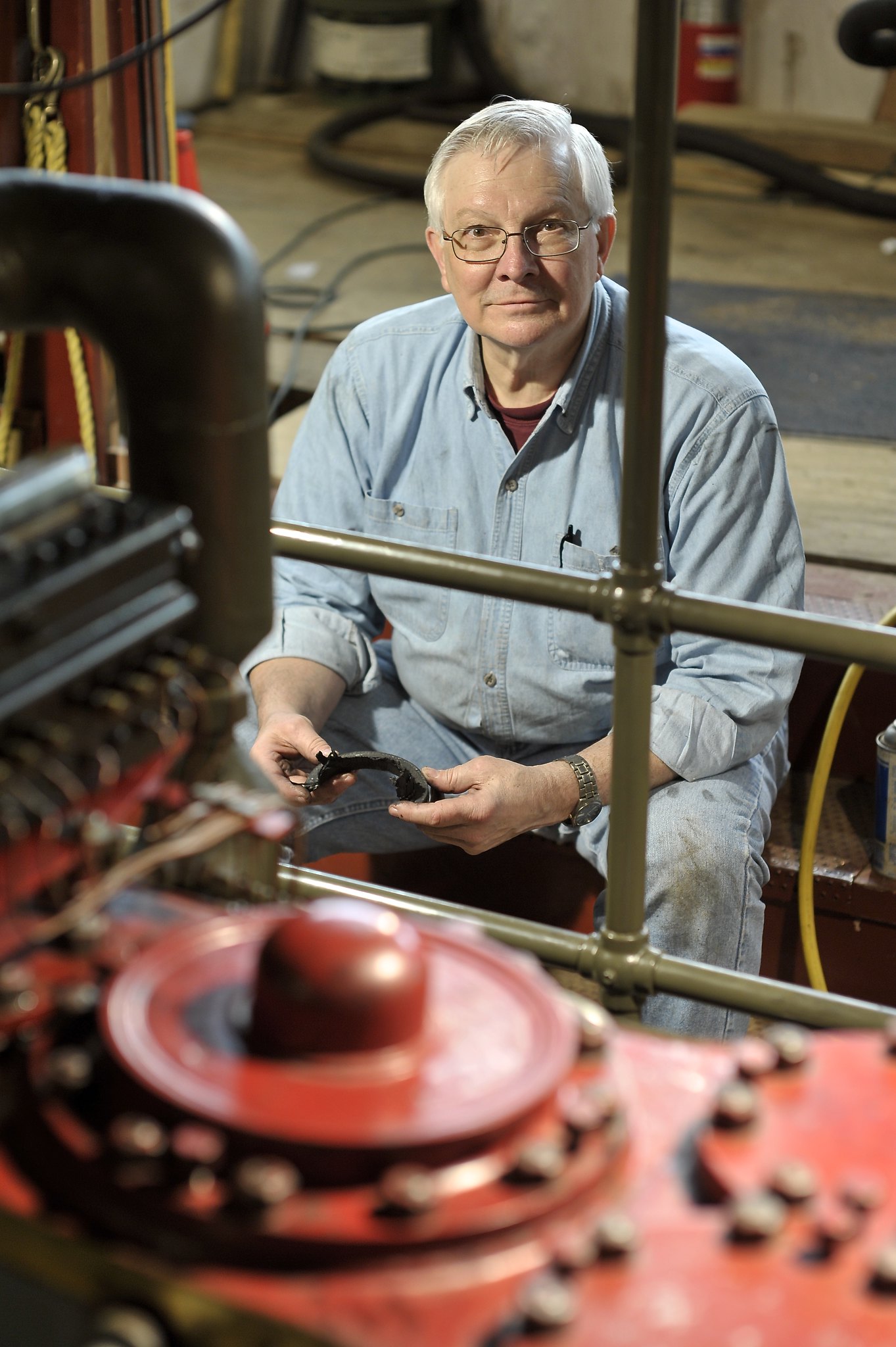
Spotlight On
Professor Jeffrey Schott
Chris Kwapick
Senate associate, University Senate Office
Minnesotans love their weekend activities, especially in the spring, summer, and fall. When the weather gets warmer, we like to get outdoors with family and friends and do many of the things Minnesota is famous for: hiking, fishing, bike riding, or going “up north” to the cabin, just to name a few. But since 2010, weekends for chemical engineering professor, Jeffrey Schott (left), mean something quite different: working on a century-old steamboat on Lake Minnetonka.
Steamboat Minnehaha was originally a part of the Twin Cities’ turn of the century streetcar system, extending its transit service to residents on the lake. With the improvements of roads and the rising interest in automobiles, the “streetcar boats” were scrapped and scuttled (sunk) to the bottom of the lake in 1926. In 1980, Minnehaha was salvaged and restoration work began in 1990, with functioning services restarted in 1996. After taking a few rides on the vessel, Schott learned that all work on the boat was done by volunteers and decided to pitch in. “Hey, you can play with a steam engine on a boat. What’s greater than that?” said Schott. Later, Schott was asked to serve as the director of operations and currently serves as the president of the Museum of Lake Minnetonka, which owns the boat.
For Schott, a knack for improving and fixing things has in many ways defined his career. A Minnesotan for most of his life, Schott graduated from Mounds View High School and would go on to receive his bachelors, masters, and PhD all in chemical engineering from the University of Minnesota. For 25 years, he worked for several companies outside of Minnesota, including Amoco, Avery, and Sigma Chemical before retiring from industry in order to become a licensed contractor for rehabbing homes. “What can I say? I like making sawdust. I like making and building things because it gives you a real sense of accomplishment.” While he enjoys working with his hands, Schott would eventually feel a call to return to the University in the chemical engineering department as an adjunct professor in August 2001.
After becoming a full time faculty member, he found many projects apart from his teaching that have kept him active. For the past fifteen years, he and a colleague have done all of the maintenance and repair on the equipment in the unit operations laboratory. He also runs nitrogen and liquid nitrogen systems for Amundson Hall. Schott says that the major accomplishment of his career was his participation in the construction of the Gore Annex to Amundson Hall as the department project manager. “This was a 42,000 square foot addition that added six floors of lab space. The project will probably be the final major addition to the building considering the lack of space due to the light rail tracks on Washington Avenue. When (former department head) Frank Bates found out I had a history in construction, he asked me to serve in this role. To have a hand in the planning and building of something that will be here long after I leave is pretty cool.”
With the completion of the Gore Annex in 2014, Schott looked to continue his service to the University in another way, by joining University Senate governance. Schott currently serves in the Faculty Senate and as chair of the University Senate’s Student Academic Integrity Committee (SAIC). During his tenure, Schott spearheaded the committee’s comprehensive review of the adequacy of measures taken to promote academic integrity by all 24 colleges across the five system campuses. Schott said that, like in construction where a strong foundation is key to the stability of a project, academic integrity is the foundation of a person’s career. “Academic integrity is important and without it nothing else matters,” said Schott. “We are educating students to become the leaders of whatever area they are in. If industry and other academic institutions can’t trust or believe the things that people produce, then you are building something on quicksand. You won’t develop as a person and things can fall apart.”
During the SAIC’s multiple conversations and presentations from representatives across the University, a common theme came to the forefront: academic and scholastic dishonesty usually stems from a lack of education around academic integrity. With that in mind, the committee developed a recommendation that students be required to complete an online module regarding academic integrity upon their matriculation at the University. Schott said that bringing a more proactive approach to the prevention of cheating, plagiarism, and other scholastic dishonesty will have an immense benefit to the student body and University as a whole.
Schott hopes to continue these conversations and work with campus partners during the next several months to convince academic leaders to implement these modules. “The work already being done to craft these modules by the talented folks from the University Libraries has got us off on the right foot,” Schott said. While this issue is important to most people at the University, it is going to take buy-in from the entire community to effectively implement a system like this. Like maintenance on a steamboat, this work requires a team approach from individuals dedicated to something larger than themselves. Without the strong foundation of integrity, the University would not have the credibility to ferry the state of Minnesota into the future.